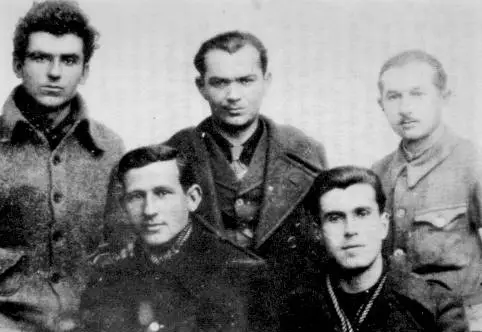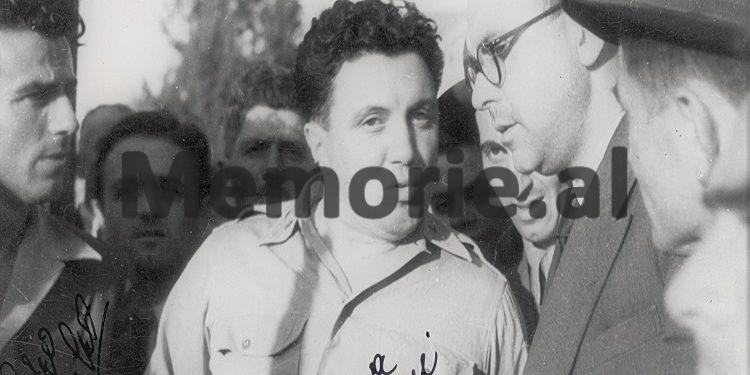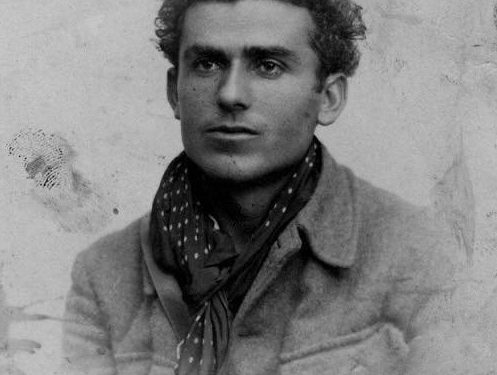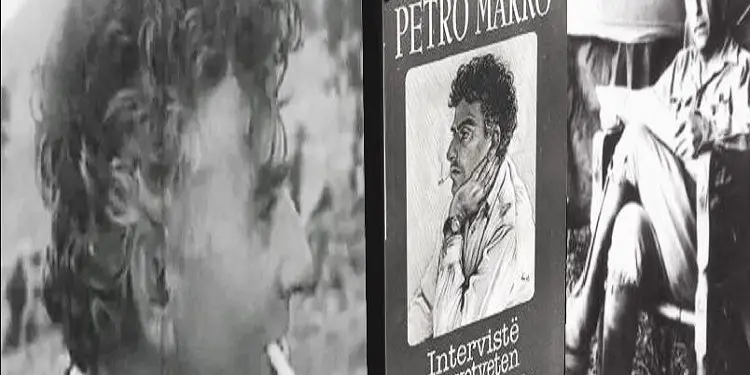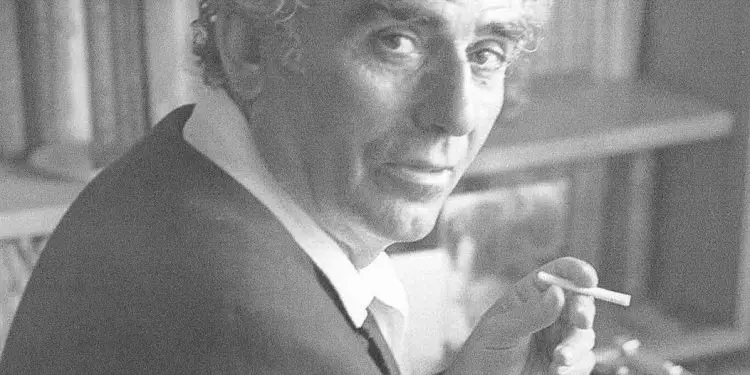By Stavri Marko
Memorie.al / Petro Marko was born in Dhërmi in 1913. His childhood was spent in his native village, which he says that; “Dërmiu is the most beautiful village in the world”. Educated by a well-known and patriotic family from Himariot, Petroja would then study at the “Commercial” School in Vlora. After finishing school in the 30s, he was appointed as an Albanian language teacher in the Dropulli area. Precisely in those years, Petroja began to show talent in the field of manuscripts and journalism. At that time, Petroja remembered with respect Branko Merxhani, from whom he was connected in the field of publishing.
“Ora” would be the first newspaper where Petro Marko, 25 years old, would start writing the first articles attacking Zog’s regime, for the social, cultural and economic backwardness in which the country was located. Then with the other newspaper “ABC”, Petro Marko would add his talent to intellectual formation, especially against the new spirit that had just reigned in Europe, that of fascism. For some published writings, he was imprisoned several times under the strong censorship of Zog’s regime.
Petro was separated from Himara early and kept contact with his family at a distance. At that time he was settled in Tirana and around 1934-35 he received a scholarship to study in Paris, where especially the then Minister of Education of the Kingdom of Zogu, Hil Mosi, helped him by seeing the strong pen of Petros, to continue studying abroad.
Petro Marko would be forced to interrupt his studies when the war began in Spain. At that time he joined patriots and revolutionaries, as he said at the time that; “They were all determined communists” to fight fascism.
Precisely in 1936, Petro Marko, together with many other Albanians, registered in the Brigades of the volunteer forces of Spain. There, apart from the warriors of all countries, he also met the famous Ernest Hemingway, whom he said was a colossus of great proportions.
Petro would put the events of Spain on paper and publish them during the Enver Hoxha dictatorship, but with a completely different nature, that of censorship, the banning of works and poems and dictated by the communist propaganda of that time.
The occupation of Fascist Italy found Petro in exile in France, which had returned after the Spanish war. He immediately came to Albania and met with patriots and communists, including Nako Spiro, Sejfulla Malëshova, Skënder Luarasi, Mehmet Shehu, Koci Xoxen, etc., and took part in the guerrilla resistance against fascism.
In 1941, when he was operating in Tirana, he was arrested and interned in Ustika prisons in Italy, from where he was released after the end of the Second World War. After the liberation, Petro Marko would establish the newspaper “Bashkimi”, but in 1947, he would be arrested, accused of being an “agent of the Anglo-Americans”.
After spending about two years in the prisons of the communist regime of Enver Hoxha, Petroja would start life differently from what he had wanted and what he had fought for his country, under the long rule of the Hoxha dynasty, during which he himself said that; “to know that Albania would have ended up under a dictatorship, would have stayed somewhere in the west and from there, perhaps, would have served his country and nation better”, than under the threat of the communist dictatorship in Albania .
Married to Safo, the beautiful painter, Petro would also educate his two children, Jamarbër and Arianita, under the contemporary spirit of art and civic culture. But this is where the adventures of his life begin.
The writer who would later become a real professional, with his publications and reports, both in print and in publications, would quickly enjoy the respect of many Albanians and patriots, not only in the country, but also abroad. The publications of Petro Markos began to be translated into different languages of the world.
Works such as; “Hasta La Vista”, “The last city”, “Ara ne Mal”, “A name in four roads”, “Pirates’ cave”, etc., would fill Albanian and European bookstores, even as far as Japan and America .
With the release of Petro Marko’s publications, Albanian literature entered the spirit of modern literature, the originality of which went beyond imaginary borders. It was Dhërmiu, which he said was the most beautiful village in the world, the place where Petro would begin to connect all his artistic and literary creativity.
Dhermiu and Himara would remain unforgotten in the memory of Petros, of whom he said that; “In that place, the stones and the clouds talk together”, while he could not describe in words the collision of the waves and their noise with the rocks in the evenings by the sea.
Throughout his literary career, until Petro Marko was removed from the League of Writers and Artists, Dhërmiu and his ordinary people would constitute the essence of the characters of his writings and works, where often names and characters of the legends of the banks of Himara, would attract the world of Albanian children and youth with interest.
The characters of the books with heroines, pirates and captains, would be turned into movies, while with the editions of modern novels of our literature, he would also win high titles, such as in 1959, the “Republic Award”. Even after his moral persecution and as a professional writer, Petroja did not give up his works and writings.
He simply wrote in a house, which he did not change until his death, (opposite the former “Arbëria” Hotel), in a room where only the sound of the typewriter was heard and the deep smell of tobacco, which he smoked until the night late.
In his house, hundreds of friends and comrades, patriots and fellow villagers, from Himara and other parts of Albania, have entered, for problems and troubles, why not and talents to learn the art of Petros later.
Meanwhile, he would feel his persecution even more when Madu, (as they called Petros’ son for short), would be put in prison for anti-communist propaganda. In those two years of the overthrow of the dictatorship, Petroja would have in his hands the most beautiful manuscripts of his life, but he unfortunately died on December 24, 1991.
Some time ago, he founded the Republican Party, for which he said that; “it must become truly republican, with modern and non-communist concepts”. The legacy he had left in the family was not too strange for people born on the Ionian coast.
He wanted to be buried in Dhërmi. The author of these lines lived the last three years of Petro Marko’s life, together with him, moments of sadness and joy, from the beginning of Petro’s publications and until his death, which did not separate you for a single moment, precisely in that small room, where Petroja, lying in bed, waited and escorted many of his friends and well-wishers, as if he wanted to hang out and only hang out with them.
But here, one winter night, while Albanian Radio-Television announced the death of one of the giants of Albanian literature, Petro Markon, the next day his body would travel and be buried near the stones of Dhërmi, at the grave of the first him, and why Llogorai that day, covered with snow and ice, would allow the coffin and the friends who accompanied him, without any hindrance.
Petro Marko rests today in “The most beautiful village in the world”, Dhërmi, among olives and oranges, but also the smell of Ion’s iodine. Today, after so many years, the President of the Republic of Albania, Rexhep Meidani, has posthumously awarded the high title “Grand Master of Work” to Petro Markos, for his high merits in the service of the nation, the homeland, art and literature. With the work of Petro Markos, the Vlora City Theater got his name. Memorie.al




